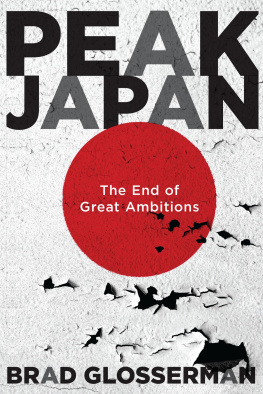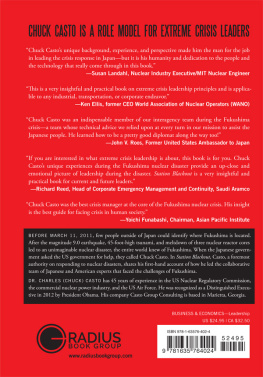2019 Georgetown University Press. All rights reserved. No part of this book may be reproduced or utilized in any form or by any means, electronic or mechanical, including photocopying and recording, or by any information storage and retrieval system, without permission in writing from the publisher.
The publisher is not responsible for third-party websites or their content. URL links were active at time of publication.
Library of Congress Cataloging-in-Publication Data
Names: Glosserman, Brad, author.
Title: Peak Japan : The End of Great Ambitions / Brad Glosserman.
Description: Washington, DC : Georgetown University Press, 2019. | Includes bibliographical references and index.
Identifiers: LCCN 2018025058 (print) | LCCN 2018032310 (ebook) | ISBN 9781626166707 (ebook) | ISBN 9781626166684 (hardcover : alk. paper)
Subjects: LCSH: JapanPolitics and government1989 | JapanEconomic conditions1989 | JapanEconomic policy1989 | JapanForeign relations1989 | National securityJapan.
Classification: LCC DS891 (ebook) | LCC DS891 .G56 2019 (print) | DDC 952.05dc23
LC record available at https://lccn.loc.gov/2018025058

This book is printed on acid-free paper meeting the requirements of the American National Standard for Permanence in Paper for Printed Library Materials.
20 199 8 7 6 5 4 3 2First printing
Printed in the United States of America.
Jacket design: Martyn Schmoll
Cover image: iStockphoto
ACKNOWLEDGMENTS
This book has been a long time in the making. It is the fruit of twenty-seven years (and counting) of living in Japan and working on Japan-related issues. Many people have contributed to its birth and the analysis it contains. What follows is only a partial list and my apologies to anyone who is left out.
First, thanks go to Allan Song of the Smith Richardson Foundation, who first approached me with the idea to explore the impact of the March 11, 2011, triple catastrophe in Japan. As always, Allan was forward leaning and sensitive to the significance of this moment for Japan and, by extension, for the United States. I will always be grateful for his support, his vision, and his patience as this project took shape. Thanks too go to Don Jacobs at Georgetown University Press, who gave the book a home and helped turn my musings into something marketable. Also at the press, Glenn Saltzman shepherded it through the production process, and Natalie McGartland did her best to ensure it got noticed in the real world. Vicki Chamlee fine-tuned the manuscript. The Australia Strategic Policy Institute gets a shout for publishing the first kernel of this study when it put out the special report Peak Japan in March 2016.
A long list of individuals gave generously of their time and thoughts about Japan, its future, and its role in the world. They include students, business professionals, academics, analysts, politicians, and government officials. Most of them are identified in the book, but a considerable number in that last groupgovernment officialscannot be identified for understandable reasons. Many of the comments I received did not make this final version of the manuscript, but all the people I talked to were insightful, and their thoughts helped shape my analysis.
In addition, several folks have played outsize roles in my thinking about Japan and its place in the world. Topping this list are Scott Snyder, Gordon Flake, Victor Cha, Satoh Haruko, Michael Urena, Ken Kaihara, Richard Jerram, Robert Madsen, and Christopher Sigur. They have all provided insight and, more important, advice and friendship.
At the Pacific Forum, where most of the work for this book was done, thanks go to virtually everyone. Ralph Cossapresident, mentor, and friendmade all this possible when he offered me the chance to join him at the forum in 2001 and help transform that organization. Georgette Almeida and Brooke Mizuno helped make my writings presentable. Japanese members of the Pacific Forum Young Leaders program, along with Japanese fellows whom the Pacific Forum hosted, provided invaluable observations on the thinking of the next generation of Japanese. I profited from the help of interns and research assistants, among them Yomon Chisato, Yoshida Takashi, Chris Ota, Eric Jacobson, and Jacob Merkle. Finally, there is Carl Baker, a close friend who has never failed me with guidance and advice. Carl always demanded that I think harder, more rigorously structure my analysis, and challenge the conventional wisdom. He has frustrated and pushed meand almost invariably has been right. This book is much better for his wisdom and patience.
At Tama University I owe a special thanks to Igata Akira, a colleague who also put up with me when he was a visiting fellow at the Pacific Forum CSIS and as a Young Leader. He has provided great insight into Japan and lots of help throughout the books gestation. Thanks too go to Kokubun Toshifumi, the director of the Center for Rule-making Strategies, for his leap of faith in bringing me on board. The UtagawasReizo, Eiko, and Daisukegot me to Japan in the first place. None of this would have been possible without their support and guidance.
Finally, a very special thanks go to my wife, Fan Li. She may well be the real Japan expert in our family. She has provided many of the most important insights into the ways that Japan works and the thinking of the Japanese, expanding my perspective far beyond the political and policy worlds where I am most comfortable. She has been instrumental in helping me see the totality of the country and in helping me take note of and understand things often right in front of me that I had missed. And she has put up with my working on a book that has taken far longer than anticipated.
INTRODUCTION
Japan is understudied, undervalued, and underappreciated in the analysis and conduct of international relations. One reason for this sad state of affairs is the rise of China and the fundamental questions that it poses for the international order. Its stunning success has profound implications for international security and the conduct of foreign policy worldwide, as do its business practices and its internet and media policies. The rise of a peer competitor to the United States, one threatening US preeminence in Asia while simultaneously being a key US partner on many issues, has attractedif not demandedthe attention of analysts and policymakers. It has overshadowed Japan (along with other US allies and partners) and has frequently cast Japans relationship with the United States as a mere adjunct to a larger set of concerns.
A second reason for the neglect of Japan is that the country lost its way after the end of the Cold War. Once anticipated to overtake the United States (much as China is today), Japan stumbled repeatedly, producing a decline as spectacular and as confounding as its rise during the preceding decades. From just about every angle, the nations confidence had been shattered, and Japan is struggling to find its place in a rapidly changing world.
This stagnation and loss of direction are perplexing. Japan has demonstrated a capacity to formulate national goals and to mobilize the country in pursuit of their realization. Twice in its modern history, those efforts demanded striking reversals in national policy and objectives. At other moments, the Japanese people banded together in a display of unity and purpose that prompted speculations of a unique culture and social order. Yet since the end of the Cold War, Japan has drifted despite both ample analysis of the countrys problems and widespread consensus on their causes and their cures. Political, business, and social leaders have sounded the alarm about the countrys future if its current trajectory continues, and many of those warnings have proven prescient. The public has not hesitated to announce its dissatisfaction with current circumstances or its worries about future prospects. Yet the national trajectory remains largely unaltered.









 This book is printed on acid-free paper meeting the requirements of the American National Standard for Permanence in Paper for Printed Library Materials.
This book is printed on acid-free paper meeting the requirements of the American National Standard for Permanence in Paper for Printed Library Materials.